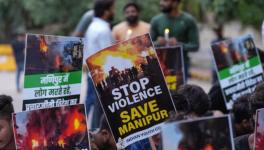Phoolan Devi or Kuki Women: Only Graphic Videos Jolt India’s Conscience
FIle Photo.
It ultimately took a video of women stripped naked and being sexually abused to strike India’s imagination and for the Prime Minister to break his silence on Manipur. It seems a repetition of the past when people took note of Phoolan Devi only when she shot her tormentors. Still, when Shekhar Kapur released his film Bandit Queen, a purported life-story of Phoolan Devi, he included in it a prolonged scene where the repeated closing and opening of a door represented her being raped by countless men.
That scene in Bandit Queen, too, caught the imagination of Indians. It is not unlike today, when millions have watched an uncensored video, purportedly of two Kuki women being brutally sexually attacked by a mob of allegedly Meitei men. Few care to note that such videos violate the right to privacy of women. The millions of viewers are brutalising these women all over again.
What is it about Indians and the political establishment that they cannot respond to even the most stark violence, especially against women, unless they see it on video? The victims of the assault in Manipur are alive and trying to piece together their lives. One of them recently married. The other has spoken to the media about the incident—but it certainly does not mean her videos or photographs can be circulated amongst the public. It’s not only unjust but illegal. But will there be consequences? Phoolan Devi was also alive and a public figure when Kapur decided to release his film with the rape scene. Less than a decade after the film’s release, she was shot dead outside her official bungalow in the heart of the capital. So, nothing had changed.
Will today also be a repeat of the past? Will the perpetrators of the Manipur gang rapes lead to a palpable change in how crimes against women are treated by the Indian state now that the Prime Minister has taken note of it, too? Or will it be like Phoolan Devi’s case, in which her killer, the notorious Sher Singh Rana, who escaped from the high-security Tihar Jail, was recaptured and ultimately released on bail in 2016? Thereafter, in a bitter twist of irony, Rana was reportedly mobilising the elite Rajputs of Uttar Pradesh against its Dalits. A new movie with Rana as its hero is hot on the anvil.
Yes, digital media has turned citizens into journalists, helping them unmask the misdeeds of other citizens and the state alike. But that cannot be the government’s official position on how it responds to violent events. News of alleged rapes during the Manipur clashes have been in the public domain for well over a month. NewsClick first brought the allegations to light on 1 June in a detailed piece by Hoineilhing Sithlou, who teaches sociology at the University of Hyderabad. Prof Sithlou painstakingly narrates in her article what the families of the alleged rape victims, including the women in the widely-circulated video, told her. She uncovers the conspiracy of fake news that led to these acts of extreme brutality. Her report was picked up by other news outlets. In short, there was enough to go by for the government and the Prime Minister to condemn and take action against such crimes.
Even Kuki groups have repeatedly said for several weeks that women of their tribe were raped during the Manipur violence. They even saw it as part of an ethnic cleansing bid. For all these reasons, the 79-day silence of the Prime Minister on Manipur, broken on Thursday, is disheartening.
The video brings public attention back to the violence in Manipur and the scale of atrocities. But the government and Prime Minister need not have waited once the media had blown the lid off such crimes. Until the video surfaced on 19 July, Modi never even uttered “Manipur” in public despite entreaties to condemn the Kuki-Meitei clashes which have claimed at least 142 lives.
Perhaps, the Prime Minister has spoken now because so many people have watched the video of naked women being dragged by a mob. He may have felt compelled to condemn the violence.
But by choosing the first day of Parliament’s Monsoon Session to speak out, the Prime Minister has exposed himself to the charge of insensitivity and political expediency at the cost of women. His timing does not sit well with a government that has, for weeks, been advocating for a Uniform Civil Code, whose supposed raison d’etre is to save minority Muslim women from patriarchal customary laws.
Let us face it, the video of the mob attacking two women has thrown light on the conditions in Manipur two months ago. For the Prime Minister to wake up to this now seems a travesty.
Get the latest reports & analysis with people's perspective on Protests, movements & deep analytical videos, discussions of the current affairs in your Telegram app. Subscribe to NewsClick's Telegram channel & get Real-Time updates on stories, as they get published on our website.
























